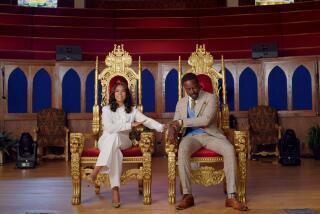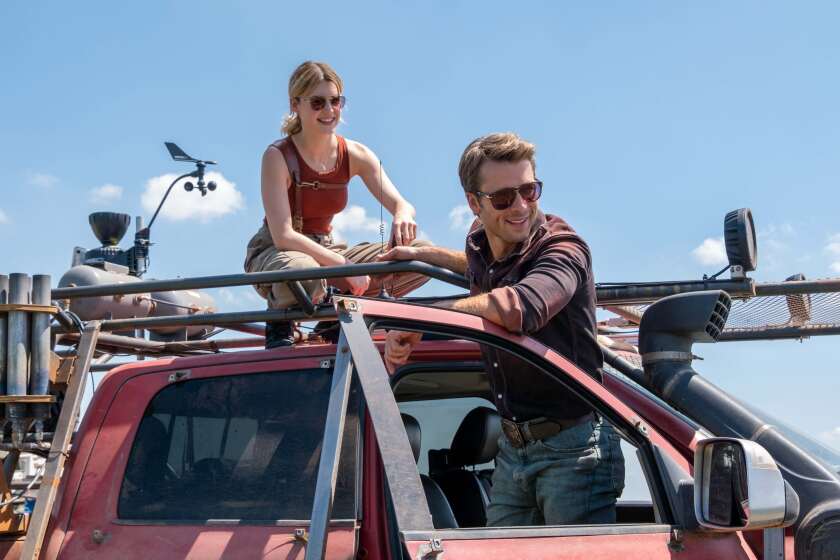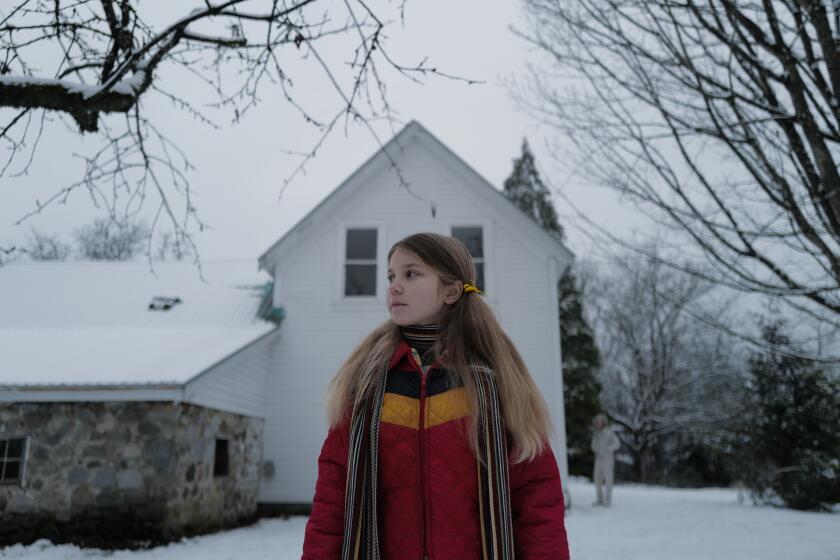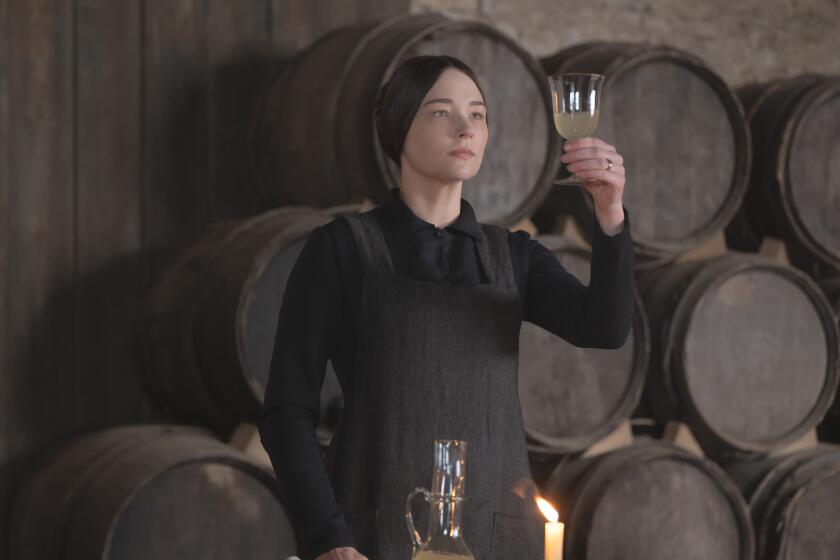MOVIE REVIEW : ‘Moderns’--Creativity in Bloom
Alan Rudolph’s “The Moderns” (opening Friday at the Music Hall in Beverly Hills) supposedly takes place in the expatriate artists’ Paris of 1926. But actually this movie--drifting along on its cloud of soft jazz, overlapping banter and wine-rich colors--transpires in no real landscape at all.
It’s a sweet, devious meditation on art, love, life and artifice: the most special and delightful of all Rudolph’s films. Like many of them, it seems at first weirdly casual. But the movie blooms as you watch it. It’s certainly pretentious. But it’s so amused at its own pretensions, it plays with them so magically, that you can’t--or shouldn’t--be disturbed.
For the record:
12:00 a.m. May 21, 1988 For the Record
Los Angeles Times Saturday May 21, 1988 Home Edition Calendar Part 6 Page 10 Column 1 Entertainment Desk 1 inches; 19 words Type of Material: Correction
The Alan Rudolph film “The Moderns” is Times-rated Mature; it has no MPAA rating. An incorrect rating was given in Thursday’s Calendar.
The film is both calculatedly naive and disarmingly sophisticated: a rich jest on gossip columns and boxing matches, truth and illusion, paint and flesh, water and fire, life and death. But, more than any of these, it’s about the mystery of creation--the way it gets battered and bent by the world.
Everything about “The Moderns” is deliberately artificial (the film’s Paris is re-created in Montreal). It opens with a monochrome archive shot of the Eiffel Tower, then cuts to a toy Eiffel Tower borne on a tray through the smoky-mirrored interior of a bistro toward the artist-hero, Nicky Hart (Keith Carradine)--who sketches the other characters as we meet them. Later on we see painted backdrops, in a Robert Delaunay style, outside the windows of apartments or cabs.
The main conflict here is between art and commerce. But, switching expectations, Rudolph makes his artist a cynical forger and his businessman a suicidal romantic. Painter-caricaturist Hart is in love with Rachel (Linda Fiorentino), the wife of vicious manufacturer Bertram Stone (John Lone); Hart’s friend and co-worker, gossip columnist Oiseau (Wallace Shawn), reintroduces them. Meanwhile, art dealer Libby Valentin (Genevieve Bujold) commissions Hart to forge three paintings--a Cezanne, a Matisse and a Modigliani--for a recently divorced dilettante, Nathalie (Geraldine Chaplin). These two plot strands sinuously knot together, like the piano and bass lines in composer Mark Isham’s score.
Moving around these main characters--whose names suggest poetics more than psychology--are actual characters of the period: Ernest Hemingway, Gertrude Stein and Alice B. Toklas. But these aren’t palpable figures. They’re the eerily dissociative beings we might meet in dreams, after falling asleep over “A Movable Feast” or “The Autobiography of Alice B. Toklas.” Hemingway (Kevin J. O’Connor) is a boyish souse who mulls over titles for a possible reminiscences (“Traveling Picnic?” “Portable Banquet?”); Stein (Elsa Raven) a gloweringly porcine grande dame who gives Hart the heave at a party.
Rudolph keeps sticking slivers of wit into the juicy pulp of his romance; the jokes have several levels. The names Hart and Stone suggest an artist’s heart and a businessman’s stony breast, but--in a pair of brilliant, constantly alive performances--Carradine and John Lone twist them around. Carradine plays Hart with hard-shell, raw-boned macho. Lone gives Stone poetic perversity and mad vulnerability. (Their screen images also echo two film noir archetypes: taciturn shamus and rich, epicene villain.) They’re warring opposites; when they box together at the American gym, the battle has such tactile smack and ferocity, such incredible physicality, that you cringe watching it.
The film dwells on fakery--and fakery played at such a pitch that it becomes a kind of cockeyed truth. Oiseau, calls the people around him “imitations of imitations,” and longs for Hollywood. As in “Trouble in Mind,” Rudolph nudges us into a world where reality is filtered through a dream, squeezed through a metaphor, strained through cinematic archetypes and peppered with parody.
But “The Moderns” is no Chinese puzzle-box. It’s a delight to the senses: a comic romance on serious subjects, packed with vibrantly witty performances (Shawn, Bujold), entrancing music and imagery. At times it looks ephemeral, yet Toyomichi Kurita’s cinematography and Steven Legler’s design also give it a near-fruity sheen, a texture you can almost taste and touch. When Carradine paints, the pigments are lusciously bright and the Isham jazz score, happily anachronistic, floats the action along.
Rudolph is a conjurer and he doesn’t work in normal modern-movie ways. His very originality is sometimes mistaken for ineptitude, his poetry and comedy for pretension and his grace for awkwardness. Yet when he’s on, his work is intoxicating. In a way, this is an old-fashioned movie-movie of an often rich and delightful kind. It’s a work that insists on its own artificiality, flaunts it--yet sometimes winds up seeming more real than reality.
The biggest irony lies in the title. The modernity of the ‘20s has become a period piece. All ages pass. Even art is not eternal: It can be burned, faked or replaced--only to be fawned over and misconstrued by gullible critics. Yet this period “Moderns” (MPAA-rated: R for sex, nudity and language) has the quality that the best Hollywood movies of the ‘40s had. It immerses you in its private world, reconciles the incongruous. In Rudolph’s dream world, life gleams and dances, and paint dries on canvas with a glow brighter than money, softer than love.
More to Read
Only good movies
Get the Indie Focus newsletter, Mark Olsen's weekly guide to the world of cinema.
You may occasionally receive promotional content from the Los Angeles Times.






